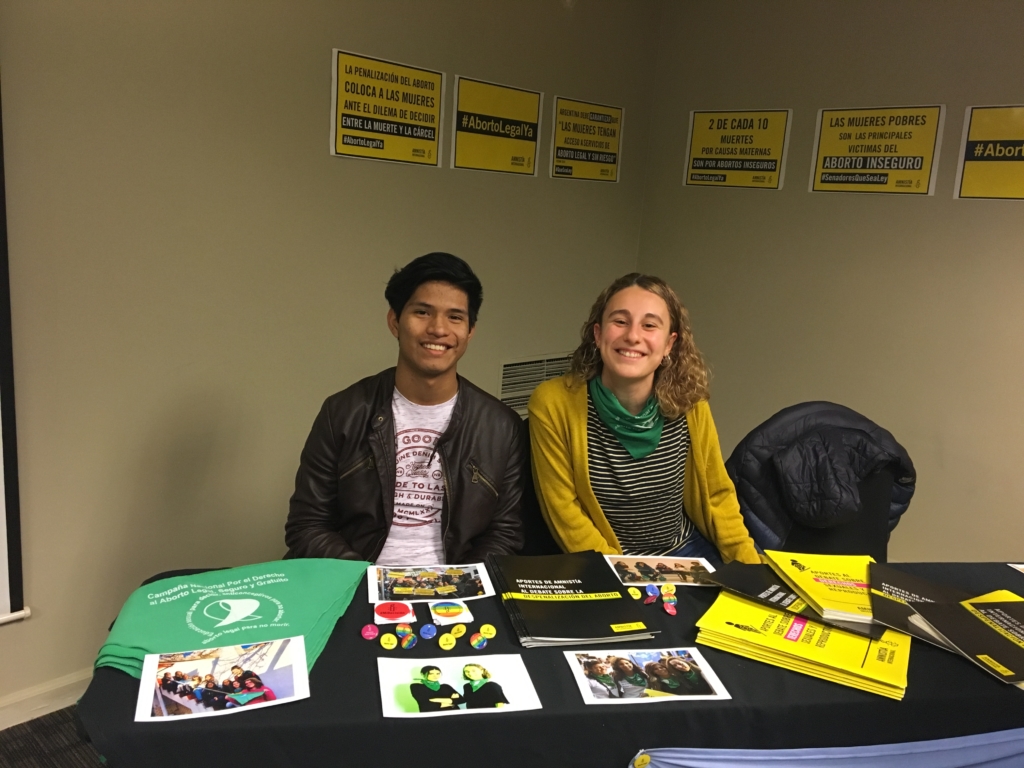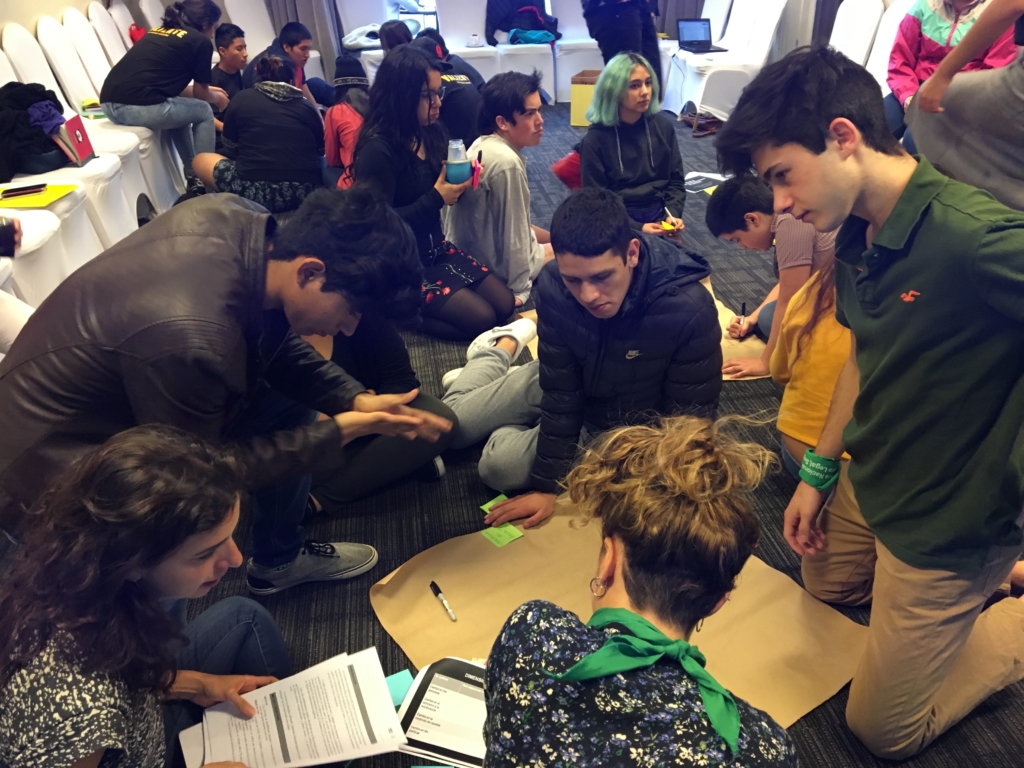Inspired by activists from across the globe learning their rights and spreading a global culture of human rights, the Transformative Power of Human Rights Education series is a window into the stories of the human rights defenders that have taken part in Amnesty’s human rights education initiatives. The series sheds light on the transformative power of HRE and the actions these activists go on to take.
Florencia Manolakis and Bruno Rodriguez are Human Rights Education activists in Argentina. They focus on Sexual and Reproductive Rights and helping Argentinian youth know and claim their rights.

How did you become an activist?
F: I became an activist because I saw that, as a young female citizen, I was being excluded from knowing and claiming my basic human rights. I knew the lack of sexual education provided in school had to be addressed, and I also realised health professionals didn’t know the human rights side of sexuality. That made me decide I had to get involved to create change and help other young people.
B: It all began with the deep indignation I felt when I learned more about the reality of minorities and other oppressed and marginalised sectors of society. In high school, I had teachers who helped me in my journey of empowerment, gave me tools. Participating in Model UN, student centres and other initiatives stimulated my interest in becoming involved in social impact.
Being an activist means getting involved in a transformative process of our surroundings, fighting for social justice and getting equality for everyone. It’s a political act. This mission motivates me every day.
How did you become involved in Human Rights Education (HRE)?
F: Thanks to Amnesty International’s Youth Group, I was able to participate in workshops. Attending these empowered me and showed me how to empower others. It also made me realise that I’m passionate about human rights and that’s what I want to work on.
These workshops give us a space to participate in training and education, and I think teaching others is the right thing to do. I realised education is one of the most crucial aspects to help, because you can empower others and that actually changes their lives. You’re not merely assisting, but rather giving them tools to exercise their rights.
B: A friend I met in the Model UN was an Amnesty activist, and he led me to Human Rights Education. I was introduced to the topic of defence and promotion of Sexual and Reproductive Rights through a workshop, and that led me to help organise further workshops in schools, equipping young people to defend their rights.
Tell us about an initiative you’ve taken part in through HRE and the change you’ve seen it make.
B: Last year was very focused on the abortion bill. We provided workshops to teach people how to campaign and influence politics. Although the bill was sadly rejected, we saw a big and positive impact. Thanks to our activism, the debate about legalising abortion was present all through society, and it got very close to being approved. We managed to make the topic visible, when it used to be taboo.
F: For the bill on the voluntary interruption of pregnancy, we teamed up with schools around the country to organise a day where young people could talk freely about what they thought. Aside from the workshops, we all signed a letter that explained to politicians why the bill’s approval was important for young people.
We did all sorts of activities on the topic during last year, trying to show people the relevance of the bill, debunking myths about abortion and explaining it’s a public health issue.
How has Human Rights Education changed your life?
B: Human Rights Education has given me the chance to know realities different to mine. It has also strengthened my beliefs about the responsibility of young activists. I’ve grown more passionate about human rights. The most important thing is that it isn’t an individual effort, human rights violations affect communities, our compromise to create social transformation is collective.
F: I feel understood, and I don’t feel alone anymore. I know there’s a community who shares my dreams and that is passionate about claiming human rights for everyone. I also feel stronger thanks to the tools Human Rights Education has provided me with to fight for human rights.

How do people’s lives change when they learn about their human rights?
F: A very brief but great example has been how Human Rights Education has enable me to empower my female friends through teaching them about contraceptives and STD prevention. Many of them didn’t know a lot, like the fact public hospitals must guarantee access to contraceptives and give you all the information you need about them.
B: My happiest moment so far has been attending a transnational youth meeting at the Universidad Autónoma de Chile while participating in the It’s My Body campaign. A student activist gave a speech showcasing the successes and struggles of the campaign for abortion, and I felt this deep emotion in my soul, seeing the positive impact and influence the Argentinian campaign has had in Latin America. I saw that Amnesty’s mission for youth is defying the impossible, fighting globally for the respect of human rights. Our campaigns for Sexual and Reproductive Rights in Argentina have created deep change and we’re bearing an immortal revolution. It’s going to be impossible to extinguish our fire.
How do you think your activism has benefited your community?
F: I think we plant the seed of activism and human rights in others. We bring attention to normalised violations of human rights. We make people think about something they just assume is normal, like violence against women, and show them how it’s not right, as it violates human rights. In our workshops, we talk about gender, trying to identify everyday signs of sexism… everything from a human rights perspective. We try to rethink, analyse and deconstruct things we take as natural.
B: There’s a law in Argentina that establishes that sexual education must be taught in schools. Unfortunately, there’s no policies in place to guarantee schools actually do it. The workshops provided by Amnesty’s Youth Group give young people what schools don’t, offering resources and tools for them to learn about their Sexual and Reproductive Rights. I think we guarantee a positive impact on these students, because thanks to these resources they can know and claim their rights.
Tell us about a time where one of the campaigns you were involved in managed to make a difference.
B: We’ve managed to get media covering in so many issues, from the bill on the voluntary termination of pregnancy to the It’s My Body project and the sexual education law.
F: The happiest moment I remember is the day the Chamber of Deputies approved the bill for the voluntary termination of pregnancy. We had been working on it for the whole year, raising awareness, showing how many deaths could be avoided. We convinced so many people who were doubtful because they didn’t have enough information, they didn’t have objective facts and data. Getting so far with something that was taboo for so long, making it visible and having people talk about it, it was very inspiring. It showed us that change may take time, but if you fight passionately, it can be achieved.


